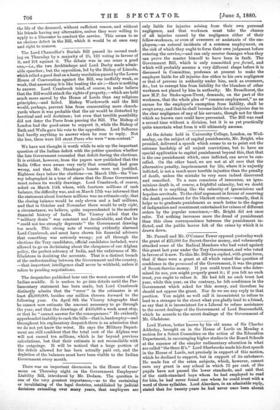At the debate held in University College, London, on Wed-
nesday, on the subject of capital punishments, Mr. Bright, who presided, delivered a speech which seems to us to point out the extreme hardship of all unjust convictions, but to have no special application to capital punishment beyond this, that that is the one punishment which, once inflicted, can never be can- celled. On the other hand, we are not at all sure that the alternative penalty, imprisonment for life, where it is unjustly inflicted, is not a much more terrible injustice than the penalty of death, unless the mistake be very soon indeed discovered and remedied. To a man conscious a innocence, an igno- minious death is, of course, a frightful calamity, but we doubt whether it is anything like the calamity of ignominious and hopeless servitude. To the chief argument in favour of reserving the death punishment for the blackest crimes,—namely, that it helps us to graduate punishment so much better to the degree of indignation and resentment entertained for crimes of different orders by the popular conscience,—Mr. Bright did not once refer. Yet nothing increases more the dread of punishment than this close correspondence between the punishment in- flicted, and the public horror felt of the crime by which it is drawn down.


































 Previous page
Previous page